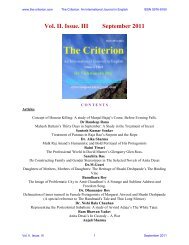Albert Camus: The Rebel Absurdist - The Criterion: An International ...
Albert Camus: The Rebel Absurdist - The Criterion: An International ...
Albert Camus: The Rebel Absurdist - The Criterion: An International ...
You also want an ePaper? Increase the reach of your titles
YUMPU automatically turns print PDFs into web optimized ePapers that Google loves.
www.the-criterion.com <strong>The</strong> <strong>Criterion</strong>: <strong>An</strong> <strong>International</strong> Journal in English ISSN 0976-8165<br />
He, in Nietzschean tradition, kills God so that man may live peacefully, and with dignity.<br />
In the footnote to his article “Portrait d’un elu” in Cahiers du Sud, April 1943 he thus<br />
described the nature of twentieth century disbelief of which he is himself the<br />
spokesperson: “Contemporary unbelief doesn’t rest on science as it did toward the close<br />
of the last century. It denies both science and religion. It is no longer the scepticism of<br />
reason in the presence of miracle. It is a passionate unbelief.”<br />
<strong>Camus</strong> rejects Christianity because it can’t justify the ways of God to man,<br />
because it is unable to appropriate evil in the world or account for it in rational terms. As<br />
<strong>Camus</strong> puts it in <strong>The</strong> <strong>Rebel</strong> : “…in its essence, Christianity (and this is its paradoxical<br />
greatness) is a doctrine of injustice. It is founded on the sacrifice of the innocent and the<br />
acceptance of this sacrifice.” Paradoxical greatness of this attitude lies in “the<br />
metamorphosis of injustice, minimization and transcendence of the abiding reality of<br />
human suffering.” Thomas L Hanna rightly notes:<br />
It is here that are found the fundamental motives of the Christian faith as well as<br />
<strong>Camus</strong>’ own thought, that is, in the problem of evil and death. For <strong>Camus</strong> the first<br />
data of religion and morality are the evil and death that are part of the abiding<br />
condition of men. Whether or not there be goodness or God is not a primary<br />
evidence of human existence -- suffering and death are. <strong>The</strong> question is what this<br />
primary evidence teaches us and what we do about it. Only after the reality of<br />
human evil is given does the question of God and ultimately man’s submission to<br />
or revolt against God arise. <strong>The</strong>se theological questions have neither meaning nor<br />
reality without this primary reference (Hanna, 1956).<br />
<strong>Camus</strong> takes up the case of innocent suffering as particularly compelling evidence<br />
of evil and the justification of the response of revolt. His response to this problem is<br />
simple and “logical.” Echoing Ivan Karamazov he argues that if this is a world in which<br />
innocents must be tortured and if there be a God who rules this world then God is unjust.<br />
<strong>The</strong> presence of evil creates an unbridgeable gulf between the innocent victims and the<br />
designs of an omnipotent and good God. This creates a tension which demands<br />
submission or revolt. Needless to say he opts for revolt (and it is this response to evil that<br />
is here critiqued as far as it informs <strong>Camus</strong>’ absurdism and pessimism and unbelief). He<br />
points out that with the appearance of a personal God to which he attributes a juristic<br />
<strong>The</strong> <strong>Criterion</strong><br />
character in the tradition of anthropomorphic theology there also appears religious guilt,<br />
crime and revolt. <strong>The</strong> prototype of this is Cain and we according to <strong>Camus</strong> are the<br />
children of Cain by way of this inheritance. <strong>The</strong> New Testament and Christ are<br />
interpreted as responses to this condition:<br />
<strong>The</strong> Christ came to solve principal problems of rebels. His solution consisted first<br />
of all in taking on their condition. <strong>The</strong> God-man suffers also – with patience.<br />
Evil and death are no longer absolutely imputable to him in as much as he suffers<br />
and dies. <strong>The</strong> night on Golgotha has so great an importance in the history of men<br />
only because the divinity, ostensibly abandoning its traditional privileges, lived<br />
through to the end the anguish of death and despair. Thus is explained the lama<br />
sabactani and the awful doubt of the Christ in agony. <strong>The</strong> agony would be light if<br />
Vol. III. Issue. I 13 March 2012
















